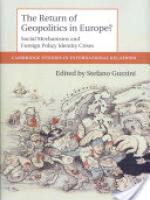Self-fulfilling geopolitics
How can it be explained that it was the very ‘peaceful change’ at the end of the Cold War that triggered the re-militarisation of European security?
Stefano Guzzini’s recent lecture exposed the main theses of his book: The Return of Geopolitics in Europe – Social Mechanisms and Foreign Policy Indentity Crisis”. The book starts from the puzzle that just when determinist approaches to world politics were undermined by the unexpected end of the Cold War, many European countries witnessed a revival of geopolitical thought. With its general understanding that geography determines politics and power, it is one of the most determinist approaches to international relations. Stefano Guzzinis book argues that analysis of foreign policy identity discourses is highly significant for understanding this paradoxical revival.
In many European countries, the end of the Cold War triggered a foreign policy identity crisis where the self-understanding and/or external role conception were in dire need of a new definition. In this moment of uncertainty, the alleged determinacy of geography, either physical or human and cultural, provided an easy and powerful fix to the anxiety.
Yet, such revival is not without consequences. Geopolitical thought tends to invert Clausewitz and turn politics into the mere prolongation of war with other means. It also ‘essentialises’ nations and other cultural entities in a manner that predisposes more polarised friend-foe relations. Militarisation of politics and essentialisation of culture, if taken seriously and believed, in turn, can trigger a self-fulfilling prophecy.
According to this understanding, it was not 9/11 that re-militarised international affairs: that militarisation had already happened in the 1990s. Paradoxically, it was the very ‘peaceful change’ of the end of the Cold War that triggered the re-militarisation of European security.
Stefano Guzzini was invited by the Graduate School in International Relations ‘San Tiago Dantas’, a consortium of Universidade Estadual Paulista (UNESP), Universidade Estadual de Campinas (UNICAMP) and Pontifícia Universidade Católica do São Paolo (PUC-SP).
